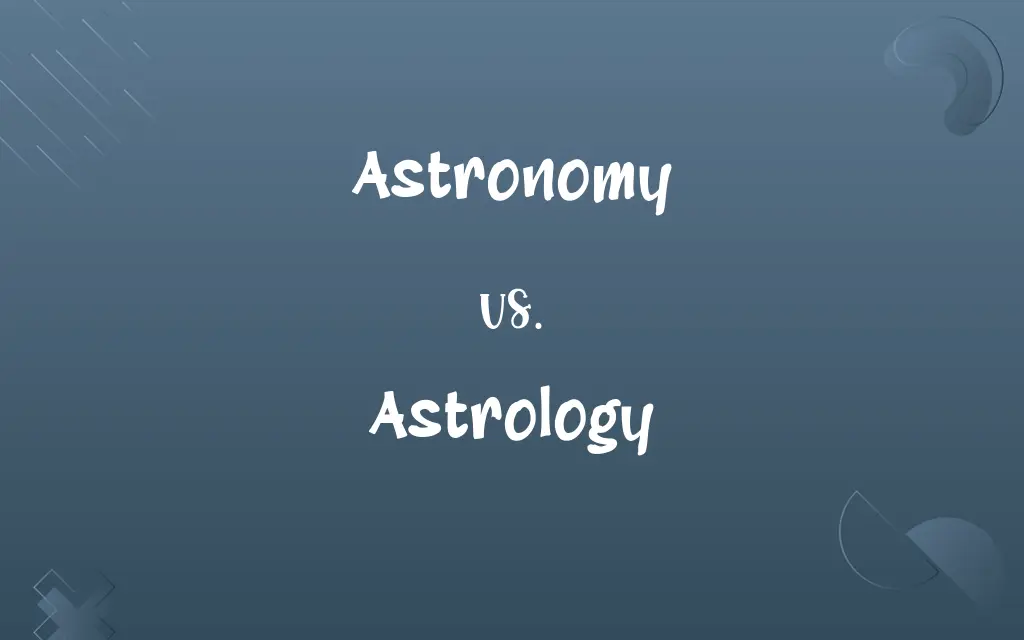Astronomy vs. Astrology: Know the Difference

By Shumaila Saeed || Updated on December 27, 2023
Astronomy is the scientific study of celestial objects and phenomena, while astrology is a belief system that suggests human affairs and terrestrial events are influenced by the positions and movements of celestial bodies.

Key Differences
Astronomy, a branch of science, systematically studies celestial bodies like stars, planets, and galaxies. Astrology, on the other hand, interprets celestial events as influencing human behavior and destiny, though lacking scientific evidence.
Shumaila Saeed
Dec 27, 2023
Astronomy relies on empirical evidence and scientific principles to understand the universe. Astrology, however, is based on traditions and beliefs, asserting that celestial alignments impact individual lives, despite lacking scientific validation.
Shumaila Saeed
Dec 27, 2023
Astronomers utilize telescopes and mathematical models to explore space and celestial phenomena. Astrologers use birth charts and planetary positions to make predictions, which are not supported by scientific methodology.
Shumaila Saeed
Dec 27, 2023
Astronomy is respected in the scientific community, contributing to our understanding of the universe. Astrology, though popular culturally, is regarded as a pseudoscience by the scientific community due to its lack of empirical support.
Shumaila Saeed
Dec 27, 2023
Astronomy is a field of study in universities, leading to careers in research and academia. Astrology, largely self-taught or learned through non-academic courses, does not offer a recognized professional or academic path in the scientific community.
Shumaila Saeed
Dec 27, 2023
ADVERTISEMENT
Comparison Chart
Definition
Science of celestial bodies
Belief in celestial influence on human affairs
Shumaila Saeed
Dec 27, 2023
ADVERTISEMENT
Astronomy and Astrology Definitions
Astronomy
Examination of galaxies and cosmic phenomena.
The Hubble Telescope has expanded our astronomy knowledge.
Shumaila Saeed
Dec 27, 2023
Astrology
Study of how celestial bodies impact life.
Astrology readings often include moon signs.
Shumaila Saeed
Dec 27, 2023
Astronomy
Research of celestial movements and properties.
Astronomy tracks the orbits of planets.
Shumaila Saeed
Dec 27, 2023
Astrology
Practice of divining information from stars.
In astrology, your sun sign is said to affect your personality.
Shumaila Saeed
Dec 27, 2023
Astronomy
Study of celestial objects.
Through astronomy, we discovered black holes.
Shumaila Saeed
Dec 27, 2023
ADVERTISEMENT
Astrology
Interpretation of celestial influence on humans.
Astrology suggests Mercury retrograde affects communication.
Shumaila Saeed
Dec 27, 2023
Astronomy
Exploration of space and celestial bodies.
Astronomy often involves analyzing light from distant stars.
Shumaila Saeed
Dec 27, 2023
Astrology
Tradition of celestial bodies guiding human affairs.
Astrology has ancient roots in many cultures.
Shumaila Saeed
Dec 27, 2023
Astronomy
Science of the universe beyond Earth.
Astronomy helps us understand the formation of stars.
Shumaila Saeed
Dec 27, 2023
Astrology
System of beliefs linking stars to fate.
Astrology charts are used to predict future events.
Shumaila Saeed
Dec 27, 2023
Astronomy
The scientific study of matter and phenomena in the universe, especially in outer space, including the positions, dimensions, distribution, motion, composition, energy, and evolution of celestial objects.
Shumaila Saeed
Oct 19, 2023
Astrology
The study of the positions and motions of celestial bodies in the belief that they have an influence on the course of natural earthly occurrences and human affairs.
Shumaila Saeed
Oct 19, 2023
Astronomy
A system of knowledge or beliefs about celestial phenomena
The various astronomies of ancient civilizations.
Shumaila Saeed
Oct 19, 2023
Astronomy
The study of the physical universe beyond the Earth's atmosphere, including the process of mapping locations and properties of the matter and radiation in the universe.
Shumaila Saeed
Oct 19, 2023
Astrology
Divination about human affairs or natural phenomena from the relative positions of celestial bodies.
Shumaila Saeed
Oct 19, 2023
Astrology
In its etymological signification, the science of the stars; among the ancients, synonymous with astronomy; subsequently, the art of judging of the influences of the stars upon human affairs, and of foretelling events by their position and aspects.
Shumaila Saeed
Oct 19, 2023
Astronomy
Astrology.
Not from the stars do I my judgment pluck;And yet methinks I have astronomy.
Shumaila Saeed
Oct 19, 2023
Astrology
A pseudoscience claiming divination by the positions of the planets and sun and moon
Shumaila Saeed
Oct 19, 2023
Astronomy
The science which treats of the celestial bodies, of their magnitudes, motions, distances, periods of revolution, eclipses, constitution, physical condition, and of the causes of their various phenomena.
Shumaila Saeed
Oct 19, 2023
Astronomy
The branch of physics that studies celestial bodies and the universe as a whole
Shumaila Saeed
Oct 19, 2023
Repeatedly Asked Queries
What is Astronomy?
Astronomy is the scientific study of celestial bodies and the universe.
Shumaila Saeed
Dec 27, 2023
Can Astronomy predict personal futures?
No, astronomy does not deal with personal predictions.
Shumaila Saeed
Dec 27, 2023
What is Astrology?
Astrology is a belief system that celestial bodies influence human life.
Shumaila Saeed
Dec 27, 2023
Are Astronomy and Astrology scientifically the same?
No, astronomy is a science, while astrology is considered a pseudoscience.
Shumaila Saeed
Dec 27, 2023
What tools do Astrologers use?
Astrologers use birth charts and planetary positions for readings.
Shumaila Saeed
Dec 27, 2023
How old is Astronomy?
Astronomy is an ancient science, dating back to early civilizations.
Shumaila Saeed
Dec 27, 2023
Does Astrology use scientific methods?
No, astrology lacks empirical evidence and scientific methodology.
Shumaila Saeed
Dec 27, 2023
Can one study Astrology academically?
Astrology is not typically part of academic curriculum in science.
Shumaila Saeed
Dec 27, 2023
What tools do Astronomers use?
Astronomers use telescopes, satellites, and computers for research.
Shumaila Saeed
Dec 27, 2023
Is Astrology based on Astronomy?
Historically, astrology was intertwined with astronomy, but they are now distinct.
Shumaila Saeed
Dec 27, 2023
What is a horoscope in Astrology?
A horoscope is an astrological chart for a specific time and place.
Shumaila Saeed
Dec 27, 2023
Can Astronomy explain the Big Bang?
Yes, astronomy studies cosmic phenomena like the Big Bang.
Shumaila Saeed
Dec 27, 2023
Does Astronomy believe in Zodiac signs?
No, Zodiac signs are part of astrology, not astronomy.
Shumaila Saeed
Dec 27, 2023
What is the main goal of Astronomy?
The main goal of astronomy is to understand the universe's structure and behavior.
Shumaila Saeed
Dec 27, 2023
Is Astronomy a career option?
Yes, it offers careers in research, academia, and space exploration.
Shumaila Saeed
Dec 27, 2023
How does Astrology define Zodiac signs?
Zodiac signs in astrology are based on the sun's position at birth.
Shumaila Saeed
Dec 27, 2023
Is Astrology universally accepted?
Astrology is popular but not universally accepted as scientifically valid.
Shumaila Saeed
Dec 27, 2023
Do Astronomers consider Astrology?
No, astronomers do not consider astrology as part of scientific study.
Shumaila Saeed
Dec 27, 2023
Do Astrologers follow scientific updates?
Astrologers may not necessarily follow scientific updates in their practice.
Shumaila Saeed
Dec 27, 2023
Are Astronomical discoveries factual?
Yes, they are based on empirical evidence and observation.
Shumaila Saeed
Dec 27, 2023
Share this page
Link for your blog / website
HTML
Link to share via messenger
About Author
Written by
Shumaila SaeedShumaila Saeed, an expert content creator with 6 years of experience, specializes in distilling complex topics into easily digestible comparisons, shining a light on the nuances that both inform and educate readers with clarity and accuracy.




































































